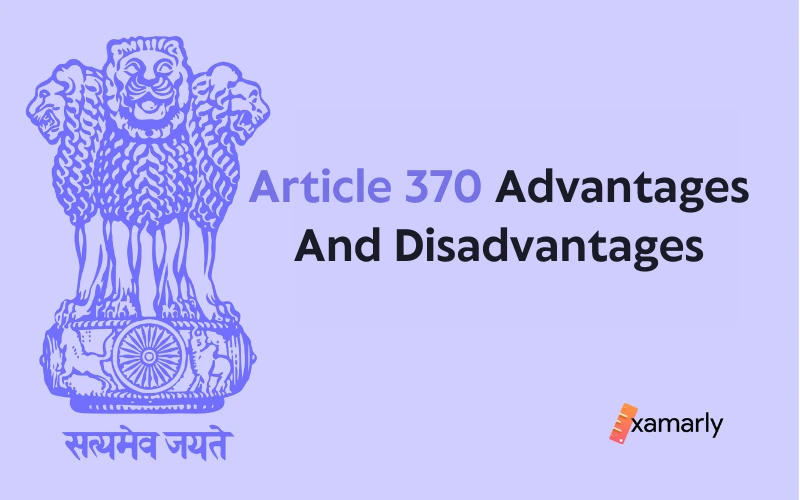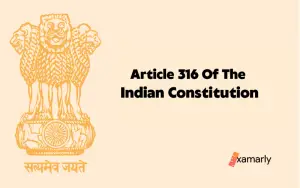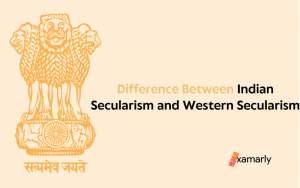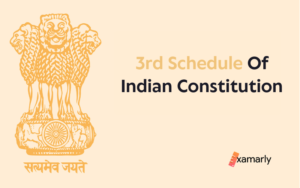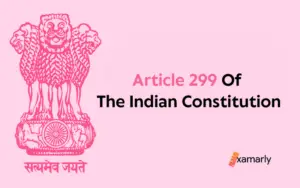Article 370 of the Indian Constitution was a temporary provision that gave the state of Jammu and Kashmir unique status. Jammu and Kashmir are located in the northern region of the Indian subcontinent.
Before Independence, the region was a princely state. During Partition, the state decided to remain a princely state rather than join India or Pakistan. But later on, Pakistan launched the war in order to free the Muslim-majority Kashmir from the Hindu powers of India.
This left Maharaja of Hari Singh of Kashmir with no other option but to seek the help of Indian forces and thus the Instrument of Accession with India was signed.
By this Jammu & Kashmir agreed to come under the Indian Subcontinent and rule. Here begins Jammu and Kashmir’s relationship with the Union of India.
In this article, we will be specifically looking at Article 370 advantages and disadvantages.
Article 370 was drafted by Ayyangar the then Minister (without portfolio) in charge of Kashmir affairs. On 17th October 1949, Article 370 was included in the Indian Constitution.
This article 370 was included in Part XXI of the Indian constitution titled – “Temporary, Transitional and Special Provisions”. This Article was Temporary as the Jammu and Kashmir Constituent Assembly had the authority to change, omit, or maintain it.
The Constitution (Application to Jammu and Kashmir) Order, 2019 was issued by the President of India on August 5, 2019, in the exercise of the powers provided by Clause (1) of Article 370 of the Constitution. The Indian government has abrogated Article 370 as a result of this.
What is Article 370? How is it Related to the Indian Government and Jammu & Kashmir?
Article 370 was implemented to secure Kashmir’s relationship with India. This article once granted Kashmir a special status and certain special rights, allowing it to keep its own separate constitution independent from the Indian constitution.
It may have had its own separate flag, distinct from the Indian flag. The local citizens used to have dual citizenship and special provisions. Even legislative powers were with the J&K government.
The Indian central government’s powers would initially be limited to three areas:
- Foreign Affairs (External Affairs)
- Defense
- Communication
After Article 370, there came another article, Article 35A, that defined Kashmir’s permanent residency, property rights, and foundational rights of the citizens. It also declared that no one from outside Kashmir is allowed to purchase land or property.
No one will be able to obtain an educational certificate, no one will be able to apply for government posts, and no outsiders will be granted voting rights. While the intention is to safeguard the lives of natives of the land, Article 35A did slide into being discriminatory.
The major goal of abolishing Article 370 is for Kashmir to be fully incorporated into India. Thus by deeming the article as ‘inoperative’, Kashmir’s ‘special status’ has been canceled and the Indian government is given the power to preside over matters of the state.
Examarly along with elaborate and factual notes will help you in your journey towards clearing UPSC.
To read about other articles and amendments to the Indian Constitution, click on the linked text in the following table.
| Presidents’ Rule Under Article 356 Of The Indian Constitution |
| Article 101 Of The Indian Constitution: Vacation Of Seat |
| 44th Amendment Of The Indian Constitution |
| 42nd Amendment Of The Indian Constitution |
Article 370 Advantages and Disadvantages
Advantages of Abrogation of Article 370 of the Indian Constitution
Many strongly believe that the Abrogation of Article 370 was the right decision that should have been taken long ago. The path towards better governance of India requires the removal of J&K’s autonomy. Let us look at some advantages that this guarantees.
- Solidifies India and Kashmir Relationship – With the abrogation of Article 370, Kashmir residents can truly enjoy the status of Indian citizens. The elimination of Article 370 benefits Kashmiris by allowing them to merge with the rest of India. From a wider perspective, better connections with other Indians and Kashmiris will ascertain better unity and strength for India as a whole.
- One Nation One Flag – With the abrogation of Article 370, all Indian states can be consolidated under one flag – the tricolor. While the idea of one flag is material, the notion behind it is even more symbolic. One flag also stands for one constitution and one governance. The phrase “one nation, one constitution” will be followed by all.
- Equal Access to Rights – The earlier notion of education, employment, and property accusation being accessible to only permanent residents of Kashmir is now removed. This echoes equality in education, livelihood, and property. Thus, anyone can seek educational scholarships and can work for the government in Kashmir.
- Right to Education – With the revocation of Article 370, all Kashmiris now enjoy the right to education. They can also apply for educational scholarships to better their social and economic access to education. The law now guarantees Kashmiris the right to receive an education from any of the state’s institutions. Further, the inflow of new educational institutes and facilities into Kashmiri soil will help improve the quality of education. Investors will pour money into Kashmir, and there is a 100 percent probability that new educational institutions will develop in the valley, educating students, particularly girls.
- Better Health Facilities – Medical facilities for citizens will improve substantially. Firstly, more private hospitals will be built in the state. This means increased availability of health care centers and better-developed facilities for the same. As Jammu & Kashmir will develop financially, people will realize the importance of good medical hospitals. Subsequently, this will raise their awareness. It will improve their lifestyle and make them more conscious about their health.
- Economic Growth – Private investors can invest in purchasing land and establishing companies in Kashmir. Increased job opportunities will certainly benefit the people of Kashmir. Further, looking at the wider picture, more industries in the region will increase the production of resources and in return boost the economic sector of the region. More money being made means more investment in the land. The prices of land will rise, allowing Kashmiris to benefit financially. Further, economic relations between Kashmiris and non-Kashmiris will widen the social and cultural market.
- Better Employment and Livelihood – Following the abrogation of Article 370, Kashmiris can earn a good living by working in any Indian-owned businesses being set up in Kashmir or situated in other places in India. As said before, there will be better job opportunities and a rise in the price of land. Kashmiris can sell their lands to Indians on a lease basis, resulting in a financial gain for the Kashmiris. Increased employment and better livelihood will result in a reduction in crime.
- Equality before Law – Because of the Constitutional provision, the people of Jammu and Kashmir are now citizens of India, regardless of whether they are Muslims or Hindus. As a result, their rights will be equal to those of the rest of the nation. The removal of special privileges will ensure greater national integration and political vulnerability. The constitution will protect the rights of minority groups in Jammu and Kashmir.
Disadvantages of Abrogation of Article 370 of the Indian Constitution
The article 370 decision is not complete without its drawbacks. The Indian government has been criticized extensively in the international press and among ill-informed politicians. Let us brush through a few reasons here.
- Possibility of Violent Breakdowns – The decision to remove the Article 370 provision in Jammu and Kashmir was made in the knowledge that violent protests would occur in the region. Nevertheless, the government has been able to control the violent protests. Further, without special rights, the chances of exploitation and violence against minorities will be more plausible.
- Discrimination against Kashmir – Kashmiri citizens consider this decision and the way it was imposed as discriminatory. Kashmiris claim that they were unaware that the Indian government planned to abolish Article 370. Many even proclaim that it was removed without consent or notification to the Jammu & Kashmir government. Factual proof like the internet and landlines being turned off in the region, troops being called and Kashmiri politicians kept on house arrest points towards an unlawful means of taking action. The way of abrogation was questioned by many and therefore it was widely criticized.
- From Special Status to Union Territory – Jammu and Kashmir’s special status has been scrapped, and it has been proclaimed a union territory. A union territory’s democracy is substantially lower than that of a normal state, and the central government will now have far more power over the state.
- Less Power to Elected State Government – Now, Kashmiris would be able to elect the state government, but their rights will be different. Unlike before, the state government will not have complete autonomy over decisions concerning the state. The people of Kashmir do not accept the decision entirely, which will lead to further political and social issues in the long run.
Conclusion
The abrogation of Article 370 is definitely a unification act for India. Bringing together Kashmir into the nation will foster better relationships among the people and further the socio-economic development of both Kashmir and India.
Following the abrogation of Article 370, the entire country will adopt the motto “one nation, one flag, one constitution.” Further, the scrapping of Article 35A will encourage corporate investment in the region, providing employment and revenue growth to the region.
In other words, this decision will bring us all together as Indians. Yet, it is for the nation to vision if this will result in any communal or regional tensions.
It is for the future to witness if we will finally go beyond the unbalanced relationship with Kashmir which has persisted since the inception of the state. It is also for us to withhold and see the multitudinous development opportunities this abrogation opens up.
FAQs
What Article 370 of the Indian Constitution deals with?
According to Article 370 of the Indian Constitution, Jammu and Kashmir hold a unique status in terms of autonomy and the power to enact laws for the state’s citizens who live there permanently.
What are the advantages of Article 370?
Some of the advantages of Article 370 of the Constitution of India are:
a. Attempts to incorporate Kashmir with other Indian states
b. It provides opportunities for the valley’s growth and development.
c. Advocates for the phrase “One Nation, One Constitution”
d. Investors from the private sector have the opportunity to contribute to the expansion of the state’s economy.
e. Due to its new status as a UT, the central government can more effectively fight corruption there.
f. The people who live in the valley might gain from an improvement in the quality of medical and educational services.
Why did Article 370 get scrapped?
Following the dissolution of the state constituent assembly in April 2018, the Supreme Court of India reached the conclusion that Article 370 had attained permanent status. Despite the fact that Article 370 is still a part of the constitution, the Indian government proclaimed it to be “inoperative” in order to get around this problem.
What are the drawbacks of scrapping Article 370 of the Indian Constitution?
Some of the drawbacks are as follows:
a. Sows the seeds of unease in a certain segment of the population.
b. Due to the requirement that they give up their dual citizenship, the locals have been given a sense of increased uneasiness.
c. A threat to democracy is posed by the application of Article 370’s abrogation.
When was Article 370 repealed?
On August 5, 2019, the government of India officially repealed Article 370 of the constitution.


